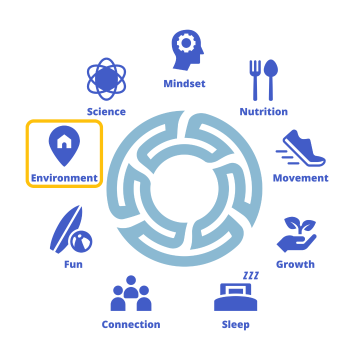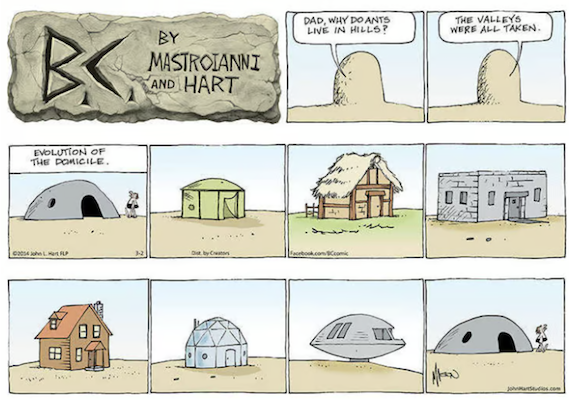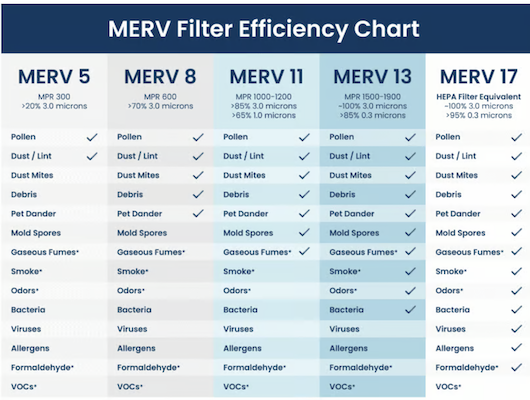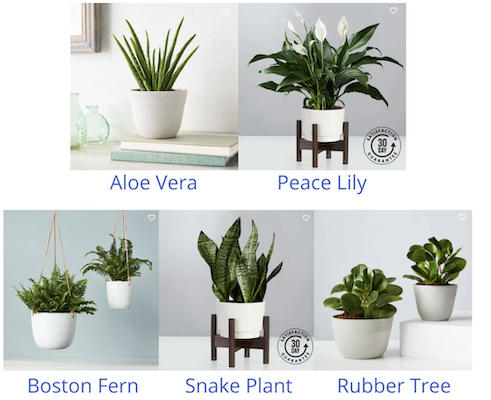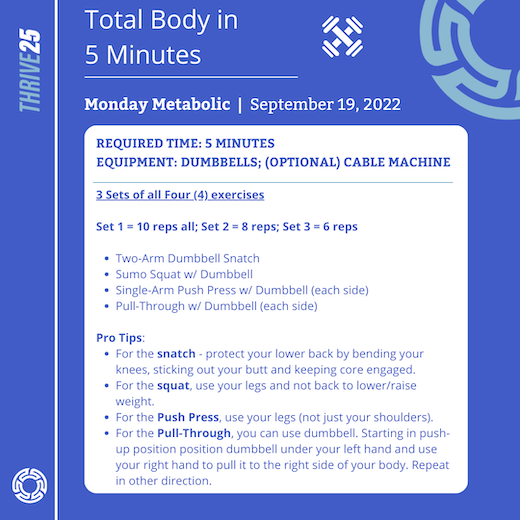Issue #25: What's In Your Home? 🏠
Good morning. It’s Monday, September 19. Let's kick off the week!
Did you miss any of our issues on NUTRITION Supplements last week? Catch up on Issues #20 - #24 here.
This week we're switching gears and talking about ENVIRONMENT - with a focus on our Home.
“Home is the starting place of love, hope, and dreams.”
We spend 75%+ of our day/night in our homes.
That time has only increased since the world shut down in 2020. (I bet most of us can think of several times we spent a full day entirely inside our home).
This week we’re going to be covering all the ways to create a home environment that is good for your mental and physical health so you can thrive!
The number of single-family detached homes in the U.S in 2021.
The Evolution of the Home
A very quick history - for most of human existence our nomadic ancestors lived without much in the way of formal shelter. The oldest known “homes” are thought to be from 400,000 years ago.
The first real homes came with the agricultural revolution at the end of the last Ice Age 12,000 years ago. These were more than just shelters as protection from the elements - they were semi-permanent structures built with the idea of a culture and community.*
So what exactly is a home?
I like the definition from Habitat for Humanity:
Home is a safe haven and a comfort zone. A place to live with and enjoy our families, friends, and pets. A place to build memories where we can truly just be ourselves.
*Additional reading on the evolution of ancestral homes over time [Credit = Nautilus]
Controlling the Air
During the pandemic all of the sudden ventilation and air quality became something we paid attention to. Before that, most of us took for granted the air we were breathing when indoors.
It's not just viruses that we have to worry about (although no doubt a big reason for clean air). Air pollution is associated with heart disease, lung cancer, and can even damage our nerves, brain, liver, and kidneys.
Air pollution is much worse inside (2-5x) than outside.
Why? The combination of 1) outdoor pollution getting trapped inside our homes and 2) the chemicals already in there.
Sources of Outdoor Pollution
PM10: particulate matter that's smaller than 10 microns (a human hair is 50-70 microns) - such as dust, pollen, mold
PM2.5: particulate matter that's smaller than 2.5 microns (mostly from human activity) - such as vehicle exhaust, factory emissions, smoke from burning wood, etc.
Ultrafine Particles (UFP's): smaller than 0.1 microns penetrate through lungs into bloodstream and every organ in body - sources can include laser printers, photocopiers, peeling of citrus fruits, tobacco smoke, and vacuum cleaners
Ozone (smog): results from heat reacting with pollutants - sources include gases from vehicles and industry such as nitrogen oxide (NOx) and volatile organic compounds (VOCs)
Want to check the air quality in your city - IQAir offers a web-based tool to type in your city or you can download their app - AirVisual.
So that’s what’s happening outside - what can you do inside your home?
Keep Your Air Clean
Here are three (3) tips to have clean air in your home:
1. Change Your HVAC Air Filters
These filters trap particulates (see above) from getting from HVAC system into the house.
How Often: You should replace these every 3 months (yep 4x per year). Consider changing them every 2 months, if:
You have hairy pets or kids (no, not hairy kids, just kids in general - need to protect their lungs)
You run the HVAC every day (i.e., the AC is blasting all summer)
You or anyone in the house has severe allergies
What to Buy: There are different levels of filters that capture more particulates based on size. Here is the MERV Scale from the EPA for when you're shopping for filters and what you want to prevent getting into your home.
2. Get House Plants
Look, I'll be the first to admit that I'm terrible at keeping plants alive!
But according to NASA (yes, NASA), plants are great at absorbing chemicals and purifying our air - so much that in the 1960's it was shown that some plants were even able to eliminate Agent Orange (one of the worst chemicals ever) from the waters in FL near a government testing facility and they are even used up in space.
Fortunately for us - one of NASA's scientists, Bill Wolverton, rated each plant by its ability to eliminate chemicals AND how easy they are to maintain (that's what I need).
So here's the list:
Peace Lily - good for rooms with low light and removes ammonia, benzene, formaldehyde, and trichloroethylene from the air
Snake Plant - literally almost impossible to kill. Survives weeks of neglect and great for our air (I speak from experience)
Aloe Vera - another easy plant. Give it some sun and it’s good to go, plus it's really good at removing formaldehyde
Boston Fern - not sure why it's "Boston", but regardless, it's great for a bathroom - it loves high humidity and low light as it removes formaldehyde and xylene from the air
Rubber Tree - looks cool and is great at removing benzene, formaldehyde, and trichlorethylene
3. Get an Electric Air Filter
We use electric air filters in our bedrooms for peace of mind and to since we are in there 8+ hrs everyday and need to get great sleep (see Issue #11).
If you really want to go deep on which air filter might be best for you - this site did a quantitative review on 10 air filters in 2022.
Product Recs
AirDoctor - this air filter is a leading recommendation from multiple functional medicine doctors. It allegedly removes 99.99% of viruses and bacteria, as well as particulates down to 0.1 microns (i.e., very small)
Phat Fudge* - check out the new flavor reishi and ashwagandha for that perfect adaptogenic chill-out snack. Ideal after a workout, long day, or stressful meeting
*Thrive25 is an Affiliate of Phat Fudge. Just click the link above and all of our readers earn 10% off regular price and we receive a small commission of any sales
Speed Read
Health & Longevity in the News
Electric & Off Road: Jeep is building its first all-electric vehicle and - it's a real Jeep (the doors bolt off, the windows detach, and you can take on a the toughest off road trails). The Jeep Recon will be available in 2024 and sign-ups start early next year. Sign us up!
Camp Pickleball: We've talked about this before - but it just seems to be growing and growing. Today there are 5 million pickleballers (is that what we call 'em?) and projected to grow to 40 million by 2030. Companies are planning massive venues to host these courts - looks like soon TopGolf won't be the only game in town.
Expanding Headspace: Headspace recently acquired Shine, a mental health and wellness app focused on the BIPOC (Black, Indigenous, and People Of Color) community. It is the second acquisition for Headspace this year, now valued over $3B - leading to a more diverse and inclusive customer base.
Monday Metabolic
Got a great workout for you to work your core, legs, and shoulders in just 5 minutes!
Click HERE to view the workout on our YouTube channel.
Workout and video courtesy of Connor J. Obrochta. Check out all of Connor's workouts on Playbook!
Thanks for joining us today! We're looking forward to tomorrow - diving into more home toxins and water quality.
Check out the latest workout videos on our YouTube channel
Got feedback? Tell us what you think at team@thrive25.com
Want this direct to your inbox? Sign up here
Why Thrive25
We’re 40-something dads that felt our bodies and minds start to slow down and we’re not ready for that. We found too much information on every subject. So we started Thrive25 to transform what we’ve learned into something useful for the rest of us to spend just 3-5 min a day to optimize our health & longevity.
This newsletter is for you and we truly value your feedback. Never hesitate to reach out to us at team@thrive25.com.
To health!
Sign up for free:
The information in this newsletter is for informational purposes only and may not be appropriate or applicable based on your individual circumstances. Thrive25 Labs LLC does not provide medical, professional, or licensed advice. Please connect with your healthcare professional for medical advice specific to your health needs.



